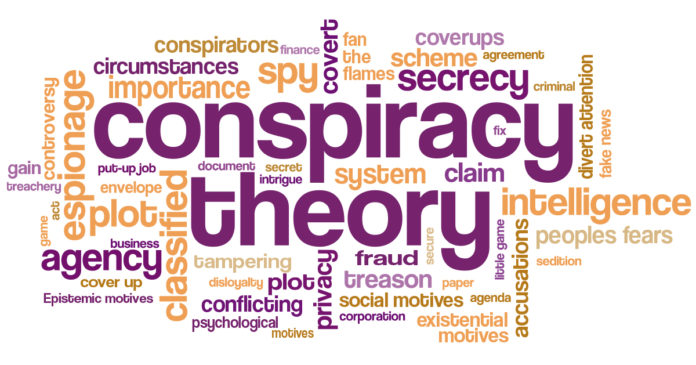Aliens, religious and political intrigue, secret world-domination societies and other far-fetched and not-so-far-fetched topics have been fueling conspiracy theories for years, decades and centuries. But why are conspiracy theories believed? Let’s face it, some are completely outlandish and others may have you scratching your head and considering the possibilities. But one thing is undeniable: conspiracy theories have a way of creeping into society and dividing it into the believers who see the “truth” and those who can’t understand why people believe such, to put it nicely, “poppycock.”
Now it isn’t appropriate to imply or say that believing in conspiracy theories is wrong. And that is where we take a deeper dive to address what causes conspiracy theories to be attractive and resonate so strongly with a population. And, from a psychological point of view, what are some of the theories on why conspiracy theories are believed.
First, before we go any further, let’s start with a proper definition of conspiracy theory. According to the Merriam-Webster website, a conspiracy theory is:
“: a theory that explains an event or set of circumstances as the result of a secret plot by usually powerful conspirators
also : a theory asserting that a secret of great importance is being kept from the public”1
What is interesting to note is that “powerful conspirators” is a two-way street. The perpetrators of a theory claim that a certain individual or group is conspiring to dupe the public or manipulate the system for their own gain. Just think back to all the political noise during the last presidential election, where accusations of conspiracy were made about fraud, tampering, coverups and the list goes on.
With conspiracy theories seeming to be running rampant over the last few years, a lot of people probably think all this activity is a new phenomenon. But in fact, human society has been dealing with conspiracy theories since, well, human society began.
One of the oldest known conspiracy theories involved the fire that destroyed Rome in 64 A.D. You’ve probably heard the saying that Nero fiddled while Rome burned.2 That description evolved from conspiracy theories about Nero and his desire to remake the city as he saw fit. Ancient biographers claimed that there were eye-witness reports of Nero actually setting the fires himself. Amid the accusations of a conspiracy, Nero tried to divert attention by blaming the burning of Rome on a small religious group at the time, called the Christians. So, he created a conspiracy theory to counter a conspiracy theory that played on people’s fears and mistrust of another group in their society. That is a key aspect to a lot of conspiracy theories, to tap into and fan the flames of people’s fear, frustration and anger.
Over the course of human history, conspiracy theories followed along in grand fashion. From religious persecution and alien spaceship crash sites to political assassinations, “fake news” and world-domination cabals, conspiracy theories have captured the imaginations of people of every generation. But why are conspiracy theories so attractive to some and completely ridiculous to others?
In a research article titled “The Psychology of Conspiracy Theories” on the Sage Journals’ website, authors Karen M. Douglas, Robbie M. Sutton, Aleksandra Cichocka address the psychological factors that fuel modern conspiracy theories.
 “This research suggests that people may be drawn to conspiracy theories when—compared with non-conspiracy explanations—they promise to satisfy important social-psychological motives that can be characterized as epistemic (e.g., the desire for understanding, accuracy, and subjective certainty), existential (e.g., the desire for control and security), and social (e.g., the desire to maintain a positive image of the self or group). This taxonomy, derived from system-justification theory (Jost, Ledgerwood, & Hardin, 2008), serves as a useful heuristic to classify the motives associated with conspiracy belief.”3
“This research suggests that people may be drawn to conspiracy theories when—compared with non-conspiracy explanations—they promise to satisfy important social-psychological motives that can be characterized as epistemic (e.g., the desire for understanding, accuracy, and subjective certainty), existential (e.g., the desire for control and security), and social (e.g., the desire to maintain a positive image of the self or group). This taxonomy, derived from system-justification theory (Jost, Ledgerwood, & Hardin, 2008), serves as a useful heuristic to classify the motives associated with conspiracy belief.”3
The authors go on to identify three classifications of motives that are typically associated with people who believe in conspiracy theories: Epistemic motives, Existential motives and Social motives.
Epistemic motivation is the desire to understand a situation or gain and process information in order to understand the meaning behind others’ emotions.
“Specific epistemic motives that causal explanations may serve include slaking curiosity when information is unavailable, reducing uncertainty and bewilderment when available information is conflicting, finding meaning when events seem random, and defending beliefs from disconfirmation. Relevant to these motives, conspiracy theories have attributes that set them apart from other types of causal explanation. Albeit to varying degrees, they are speculative in that they posit actions that are hidden from public scrutiny, complex in that they postulate the coordination of multiple actors, and resistant to falsification in that they postulate that conspirators use stealth and disinformation to cover up their actions—implying that people who try to debunk conspiracy theories may, themselves, be part of the conspiracy (Lewandowsky et al., 2015). A related property of conspiracy theories is that they can protect cherished beliefs (e.g., vaccination is harmful; climate change is not a serious concern) by casting overwhelmingly disconfirmatory evidence (e.g., scientific findings) as the product of a conspiracy (Lewandowsky, Oberauer, & Gignac, 2013).”3
The article goes on to say that epistemic motives allow people to accept and believe conspiracy theories because they provide “broad, internally consistent explanations that allow people to preserve beliefs in the face of uncertainty and contradiction.”3
Existential motives relate to the desire to feel secure and have more control over one’s life and environment. It is thought that for some, it is easy to believe conspiracy theories when their being and/or environment is perceived as being threatened.
“Conspiracy theories may promise to make people feel safer as a form of cheater detection, in which dangerous and untrustworthy individuals are recognized and the threat they posed is reduced or neutralized (Bost & Prunier, 2013).”3
The third motivation behind why people are drawn to conspiracy theories is social. A desire to be accepted and belong to a group can be a powerful motivation for believing a conspiracy theory.
“Scholars have suggested that conspiracy theories valorize the self and the in-group by allowing blame for negative outcomes to be attributed to others. Thus, they may help to uphold the image of the self and the in-group as competent and moral, but as sabotaged by powerful and unscrupulous others. If this is the case, we can expect conspiracy theories to be particularly appealing to people who find the positive image of their self or in-group to be threatened (Cichocka, Marchlewska, & Golec de Zavala, 2016).”2
A lack of understanding, inability or desire to analyze and think critically, and perceived fear or feeling of lack of control all seem to impact a person’s willingness to accept a conspiracy theory as being true. From a psychological standpoint, the epistemic, existential and social motives for belief in conspiracy theories provide valid explanations, but more research is needed. Until then, little green men, “fake news” and secret societies seeking world control will continue to be that itch you can’t scratch when it comes to considering the possibilities of conspiracy theories.
Reference:
1 https://www.merriam-webster.com/dictionary/conspiracy%20theory
2 https://journals.sagepub.com/doi/10.1177/1750698017701615
3 https://journals.sagepub.com/doi/10.1177/0963721417718261






